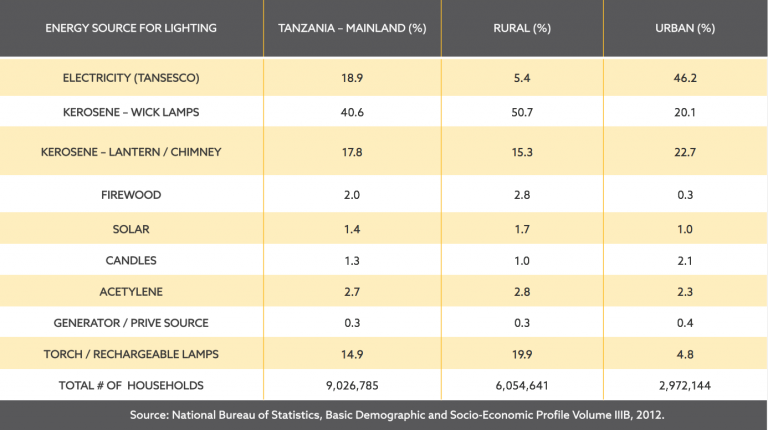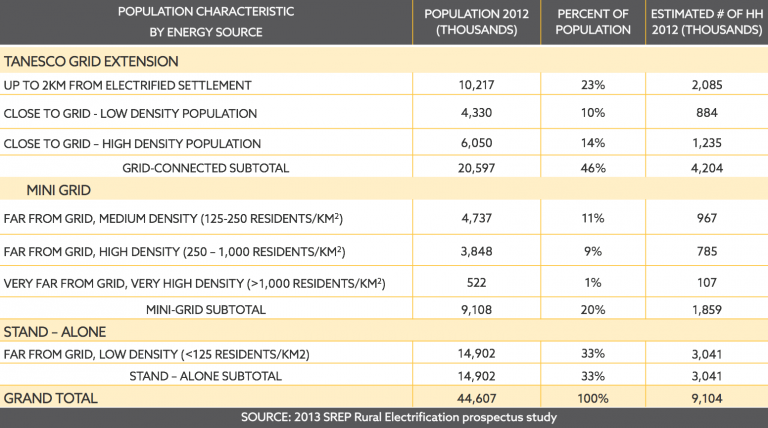Population
49.3
million
Per Capita GDP
473
USD
Electricity Access Rate
11
%rural
45
%urban
36
%national
According to the Ministry of Energy and Minerals only 36% of the national population in Tanzania is connected to the grid. While this number is up from 10% in 2010 – access is largely limited to major towns. In rural areas only 11% of the population is connected to the grid. Given the large geographical size of the country and the dispersed population, off-grid energy is well positioned to play an important role in reaching the rural population.
million
USD
rural
urban
national
million
million
Thousand Tons
People meeting their basic electricity needs as per the Multi-Tier Framework
With 64% of the population living off-grid, the use of polluting, hazardous kerosene lamps is extremely wide-spread. According to the National Bureau of Statistics, 58.4% of households in mainland Tanzania rely on these lamps as a lighting source. In rural areas this figure rises to 66% of households, and even in urban areas as many as 42.8% of households use this kerosene as a lighting source. Despite its many advantages, solar energy currently accounts for only 1.7% of lighting supply in rural areas.
The uptake of these and other sources of energy for lighting in mainland Tanzania can be seen in the table below.

The case for off-grid energy solutions in Tanzania is particularly compelling. The widely dispersed population means grid expansion is not economically feasible in many rural areas. At the same time, technological advancements and innovative business models in off-grid lighting and energy position these products as a rapidly scalable, credible alternative to the grid, at affordable costs. Off-grid energy solutions are therefore an important component of the overall universal electrification strategy in Tanzania. As can be seen in the chart below, a preliminary GEO-SIM mapping for the REA Rural Electrification Investment Prospectus in 2013 found that close to 50% of the population could be served by off-grid interventions.

Tanzania is well positioned to meet this clear space for off-grid energy solutions. It has shown a steady economic growth rate of 6.8% between 2010 and 2015 (according to the National Bureau of Statistics), and government policy has been supportive of solar power in general – and in particular of pico solar in rural areas. Furthermore, a revived agricultural export sector (tea, coffee, and cashews) is increasing rural incomes and the ability to pay for off-grid energy.
The overall goal of the Lighting Africa – Tanzania project is to contribute to the development of a commercial market for quality-verified solar lanterns and SHS. Our target is to enable access to cleaner and safer off-grid lighting and energy for 6.5 million people in Tanzania by end 2019 – focusing predominantly on low income households and micro businesses among the Bottom of the Pyramid (BOP) population.
Our program activities kicked-off in 2016, after conducting a policy environment assessment in 2010, and market research in 2013. These studies provided insight into consumer behavior, supply chain channels, and the policy framework in Tanzania, and informed the design of our program.
We will work with companies in the off-grid lighting space, such as global manufacturers of high quality products and local distribution companies, to establish new market channels in Tanzania. We will also work with a range of other stakeholders and intermediaries – including the Ministry of Energy, NGOs, and other development partners – to accelerate the entry and adoption of quality-verified products.
Our program’s activities are structured along the following components.
Quality Assurance: A key market barrier is the inability of consumers to distinguish between good and poor quality products. Poor quality products erode consumer confidence. Lighting Africa has been working with the Tanzania Bureau of Standards (TBS) to integrate the Lighting Global Quality Standards into their regulatory framework. We will continue to provide guidance to TBS until standards have been adopted. We will also work with the Tanzania Renewable Energy Association (TAREA) and Fair Competition Commission (FCC) to mitigate the impact of substandard products and counterfeits in the market.
Consumer Education: The market environment assessment conducted by Lighting Africa in 2010 found that the majority of Tanzanians – especially those at the BOP – are unfamiliar with the uses and benefits of off-grid lighting and energy products. Thus, much of the population is reluctant to invest their limited funds in these products. We will work with local partners to carry out a consumer awareness campaign in 2017, to address this market barrier. We will inform consumers of the benefits of off-grid solar products – including financial savings – and the importance of investing in quality.
Market Intelligence: In addition to the research we’ve already conducted, we plan to carry out additional market research on the off-grid sector in Tanzania in 2017. We will examine supply chains and rural market penetration. We will also look at after-sales services and innovative business models already in place, including PAYG.
Business & Supply Chain Development: This component is of particular importance to the Government of Tanzania. We will provide an array of business development support services to promote a vibrant competitive environment stimulating distribution into rural areas. We will provide technical and business skills training sessions to importers/ distributors and retailers to build capacity. We will also help to design appropriate business models and distribution channels to target new market segments in Tanzania including community organizations, women, microenterprises, and large corporations.
Access to Finance: The Lighting Africa – Tanzania team will work with financial institutions to extend access to finance for the distribution of solar energy products to the last mile, as well as working capital finance for solar energy companies. In particular, we will work to relax the terms and conditions of loans to make them affordable to local distributors.
Our impact last updated December 2018.